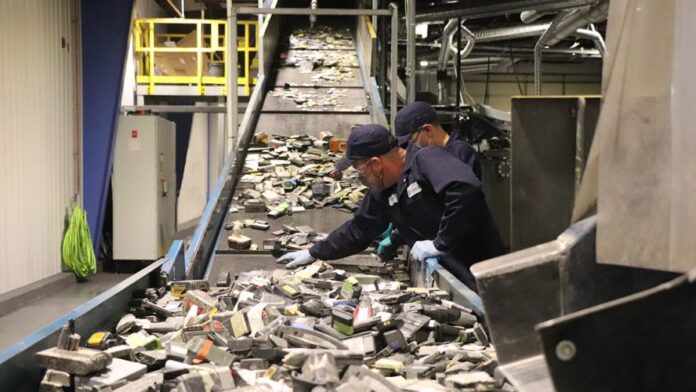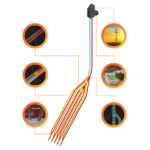Jane Marsh is a frequent contributor to 21st Century Tech Blog. Jane is an environmental journalist and Editor-in-Chief of Environment.co. Her topic today reflects the increased interest in ending our reliance on internal combustion engine transportation in favour of electrification. Today’s electric vehicles are largely running on lithium-ion battery packs. These batteries can accept thousands of recharge cycles but eventually need to be replaced. What happens to them after they are removed is seen as a growing environmental challenge with a number of startup companies developing methodologies for recycling and reuse.
Battery Recycling is Changing to Meet the 21st Century EV Challenge
The conversation around battery recycling is more potent than ever as climate change pushes public concerns about electrification and the adoption of EVs for transportation. The desire to switch to eco-friendly alternatives to gas and diesel vehicles is growing. Lithium-ion (Li-ion) battery-powered EVs are the current standard. Li-ion batteries are recyclable but present a challenge that is both demanding and expensive which is discouraging to proponents of the technology switch.
Even batteries not based on Li-ion, such as lead-acid or zinc-carbon3 present recycling challenges. Both of these battery types release toxic chemicals into the environment because of improper programs for their disposal. What is needed are circular economic solutions to make battery adoption more appealing and recycling and reuse work better.
Four companies are at the forefront of implementing technical solutions that could become industry standards and game changers. Here is a little bit about each.
Ascend Elements
Ascend collects Li-ion batteries and transforms them using a patented technology they call hydro-to-cathode. Instead of extracting the metals from scrap materials, Ascend extracts impurities rather than trying to separate and split battery materials. This method not only upcycles batteries with a 98% success rate in material reclamation but represents a reimagining of the battery-recycling industry to meet 21st-century expectations.
Prior to Ascend introducing hydro-to-cathode technology the industry was rife with excuses. Battery recycling was seen as too expensive. Some companies claimed to not have the infrastructure to support battery recycling. Some suggested that upcycled batteries would not produce the equivalent power of new Li-ion battery packs. But Ascend’s simplified alternative to hydrometallurgy and pyrometallurgy could prove revolutionary for recycling and repurposing.
Redwood Materials
Redwood wants to reduce the number of batteries that go into landfills. They want to minimize environmental degradation caused by the transportation of raw materials as well. Their goal is to maximize material recovery by up to 95%, reviving previously dead batteries into greener versions.
They have successfully revived batteries as a result and have developed partnerships with the capacity to power a million EVs. They have created a drop-off network for people to offload old cellphones, laptops and other battery-powered technology to increase the number of batteries that end up being recycled.
Currently, Redwood operates in the United States only, keeping the resources domestic to align with the company’s environmental objectives.
Cylib
This company is a European startup that is focused on rebuilding end-of-life batteries. It has a mission to reduce carbon emissions while being in the battery recycling business and strives to be a role model for exceeding regulatory EU targets with a proprietary and patented carbon-efficient hydrometallurgy first developed at RWTH Aachen University in Germany.
Hydrometallurgy as a battery recycling methodology is not new. But what Cylib is doing is improving its efficiency. The end-to-end process recovers all the valuable metals in a battery pack down to the individual cell level.
Li-Cycle
Li-Cycle’s goal is to reinvigorate supply chains by increasing Li-ion battery availability. It does this by saving and recycling batteries. Li-Cycle uses a proprietary technology it calls Spoke & Hub that combines safe mechanical size reduction and hydrometallurgical processes. It also provides consulting services to its clients related to the packaging and logistics for battery storage.
Li-ion batteries are transformed from a charged to an inert state. Cathode and anode materials get processed into battery-grade end products for reuse providing a secondary source of supply to meet the demand for critical battery materials including lithium, nickel, and cobalt to minimize the need for new resource extraction. The approach the company takes has won awards from the World Circular Economy Forum and certifications from ISO.
Finding Alternatives for Battery Recycling
These startups may appear to be in competition, but the growing demand for EVs will likely leave room for them all to find a market. Because of climate change, the global economy by necessity is moving to a low-carbon and electrification future. Startups like these will provide a solid foundation for addressing the issue of battery waste through recycling and upcycling to meet future EV and other battery-storage application demands.
Others are bound to join in as EVs overtake internal combustion engine sales. But these first-to-market companies will have established a new industry segment with a solid economic future.

















[…] Canada, two companies, Li-Cycle and Nemaska Lithium have established partnerships with EV companies to recycle and recover lithium, […]